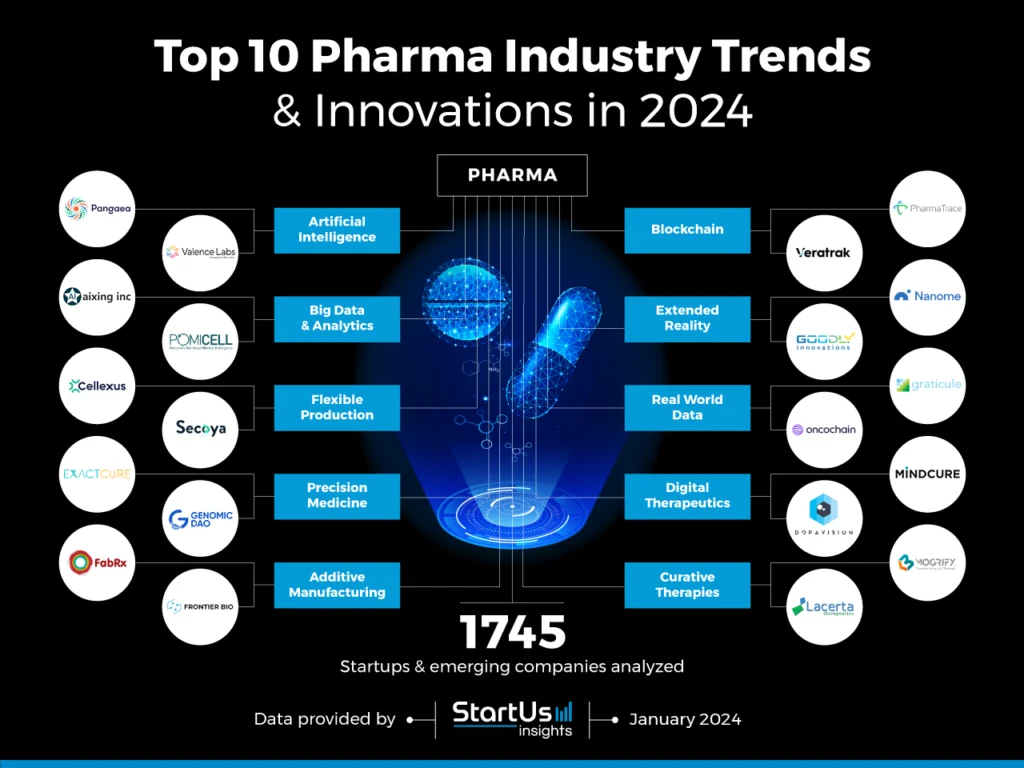Biologics and Monoclonal Antibodies: Biopharmaceuticals derived from biological sources, such as proteins, antibodies, and nucleic acids, are increasingly important. Monoclonal antibodies, in particular, are being used for targeted therapies against specific diseases like cancer and autoimmune disorders.

Gene and Cell Therapies: The advent of gene editing technologies like CRISPR-Cas9 has revolutionized gene therapy, offering potential cures for genetic disorders. Cell therapies, including CAR-T cell therapies, are also advancing rapidly, providing personalized treatments.
Personalized Medicine: Advances in genomics and biomarker identification enable personalized medicine approaches. Tailoring treatments to individual genetic profiles and disease characteristics enhances efficacy and reduces adverse effects.
Digital Health and Wearables: Digital technologies, including wearable devices and mobile health apps, are transforming healthcare delivery and patient monitoring. These tools enable real-time data collection, improving treatment outcomes and patient engagement.
Artificial Intelligence (AI) and Machine Learning: AI is revolutionizing drug discovery and development processes by analyzing vast amounts of data to identify potential drug candidates, predict patient responses, and optimize clinical trials.
Biopharma Outsourcing: Increasingly, biopharmaceutical companies are outsourcing various aspects of drug development and manufacturing to specialized contract organizations, enhancing efficiency and flexibility.
Biosimilars and Biobetters: With the expiration of patents for biologics, biosimilars (similar versions of biologic drugs) are gaining traction, offering cost-effective alternatives. Biobetters are improved versions of existing biologics with enhanced efficacy or reduced side effects.
Regenerative Medicine: This field focuses on restoring or regenerating damaged tissues and organs using stem cells, tissue engineering, and biomaterials. It holds promise for treating conditions such as spinal cord injuries and heart disease.
Sustainability and Green Biopharma: There is a growing emphasis on sustainable biopharmaceutical production practices, including reducing waste, minimizing energy consumption, and using eco-friendly materials.
Global Health Initiatives: Biopharmaceutical companies are increasingly involved in global health initiatives, addressing diseases prevalent in low-income countries and improving access to essential medicines worldwide.
Nanotechnology: Nanotechnology is being utilized to develop novel drug delivery systems that can improve drug targeting, bioavailability, and therapeutic efficacy while minimizing side effects.
Immunotherapy: Beyond monoclonal antibodies, immunotherapy approaches such as immune checkpoint inhibitors and therapeutic vaccines are gaining prominence for treating cancer and infectious diseases by harnessing the body’s immune system.
Microbiome-based Therapeutics: Research into the human microbiome has led to the development of microbiome-based therapeutics aimed at modulating gut microbiota to treat conditions such as inflammatory bowel disease, metabolic disorders, and even neurological conditions.
3D Printing in Pharmaceuticals: 3D printing technology is being explored to manufacture personalized drug formulations, medical devices, and even tissues for regenerative medicine applications.
Blockchain in Healthcare: Blockchain technology is being tested to improve the security, transparency, and efficiency of pharmaceutical supply chains, clinical trials data management, and patient health records.
Continuous Manufacturing: There is a shift towards continuous manufacturing processes in biopharmaceutical production, which can reduce costs, improve product quality, and allow for more flexible production scales.
Patient-Centric Drug Development: There is a growing emphasis on involving patients in drug development processes, from trial design to post-market surveillance, to ensure treatments meet patient needs and preferences.
Targeting Aging-related Diseases: With an aging population, there is increasing focus on developing therapies that target age-related diseases such as Alzheimer’s disease, osteoporosis, and cardiovascular diseases to improve quality of life and extend healthy lifespan.
Virtual Clinical Trials: Advances in digital health technologies are facilitating virtual clinical trials where patient data is collected remotely, reducing the need for physical site visits and potentially accelerating the drug development process.
Environmental Monitoring and Control: Biopharmaceutical companies are increasingly implementing stringent environmental monitoring and control measures to ensure product safety and compliance with regulatory standards.